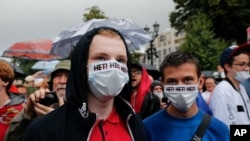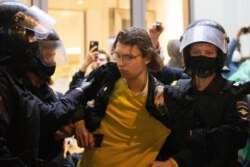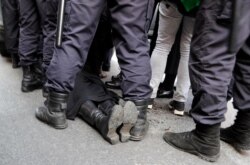Outside the Moscow headquarters of the Federal Security Service last week, some of Russia’s most prominent journalists protested the arrest of Ivan Safronov, a former journalist charged with treason. Some were briefly detained.
If this were taking place in the U.S. — or any other Western democracy — the outrage would be deafening, but in Russia, the news media’s struggle for rights has become routine.
That struggle is expected to become harder after Russia on July 1 voted to adopt amendments to its Constitution that will allow President Vladimir Putin’s government to increase pressure on freedom of speech.
The same vote that allowed Putin to reset his presidential terms to zero and potentially stay in power until 2036 also created a series of legal loopholes to the constitutional ban on censorship via protections for “historical truth,” a ban on giving Russian territory to foreign powers, and definition of marriage as between only a man and a woman.
Russian lawmakers said they would now amend about 100 laws and adopt several new ones so that legislation aligns with the constitutional amendments.
Media experts and critics say the changes could be used to further stifle criticism or debate about issues such as Russia’s annexation of Crimea, or to embolden authorities to take a harsher response to dissent.
Fears that the vote would usher in a new decline for press freedom appear to have already been realized.
Since polling concluded on July 1, Safronov was arrested and Svetlana Prokopyeva, a freelancer who contributes to Radio Free Europe/Radio Liberty, was convicted of "justifying terrorism” over a commentary published last year about terror attacks in Russia. International rights organizations called the charge “bogus” and described the case against her as an attempt to intimidate journalists.
Accused of passing secrets
Authorities accused Safronov, an adviser for Russia’s space agency who previously worked for the newspapers Kommersant and Vedomisti, of passing military secrets to the Czech Republic, a charge he denies. His lawyer and supporters say the charges are fabricated.
“The regime begins to act roughly and will continue to act even more rough. Pressure on news outlets may intensify. Most likely, funding opportunities for many Russian independent media and bloggers will be cut off,” Alexander Morozov, an expert from the Boris Nemtsov Center for the Study of Russia, at Charles University in Prague, told VOA.
The Russian Constitution officially prohibits censorship, but that hasn’t stopped authorities from persecuting critical and independent journalists.
“The amendments reflect a tendency that has existed in Russian practice, politics and law for almost 20 years now,” said Andrei Richter, who holds a professorship in media studies in Slovakia and is a former director at the Moscow Media and Law Policy Institute.
“Just like in Soviet times, the government affirms its monopoly on the truth,” he said. “Monopoly in this case means the truth recognized by the government and nothing but that truth. What’s important for the government here is whether you cross the line it has set for you in matters of freedom of speech.”
Discussion of territorial disputes
With the ban on the "alienation of Russian territory" — an amendment prohibiting Russia’s leader from giving territory to a foreign country — that line could be discussion of territorial disputes.
The State Duma, Russia’s lower house of parliament, is proposing a law that would criminalize discussion on international disputes. If it passes, journalists could risk prosecution for reporting on anything that contradicts or questions Russia’s narrative on Crimea.
Russia annexed Crimea in 2014 in a move the international community condemned and does not recognize. It has also backed separatist fighters in eastern Ukraine, Moldova and Georgia.
The same applies to reporting on same-sex marriage, which under the new amendments is viewed as unconstitutional.
Tanya Lokshina, associate director for the Europe and Central Asia division at Human Rights Watch, said the amendment “enshrines” conservative views.
“This is a symbolic gesture that logically follows from the shift to discriminate against the gay community,” she said. “Thе start of this para-governmental shift was the adoption, at federal level, of the ‘law on gay propaganda’ back in 2013. Under that law, the press can be held accountable.”
Since the 2013 law came into effect, several websites offering information and advice on gay issues have been shut down.
The amendments on “historical truth” and not diminishing “the heroic deed of Russian people when defending the Fatherland” also reflect a wider trend.
Russia's wartime history
State media have repeated comments by Putin on Europe’s role in World War II, including his comments that collusion between Europe and Adolf Hitler led to the war.
Discussion about Russia’s actions and strategy during the war has previously angered “patriotic” listeners and viewers and led to official investigations.
In 2014, for instance, the St. Petersburg prosecutor’s office investigated Dozhd TV for potential wrongdoing after the channel hosted an on-air survey about Hitler’s 900-day Siege of Leningrad that cost 800,000 civilian lives before the Russian army freed the city. Any perceived criticism is viewed as dishonoring the memory of those who died.
Several broadcast providers disconnected the channel, but prosecutors found no evidence of a crime.
Under the new amendments, the channel could face charges for “belittling heroic deeds.”
In general, Russia’s media community expects nothing good to come from the constitutional changes or proposed laws.
"Journalists already carry a very heavy burden, and Svetlana Prokopyeva’s case is an example of this,” Lokshina said. “The government drives it home to Russian journalists that any discussions related to terror or questioning whether authorities are right can fall under ‘justification of terrorism’ in the criminal code and completely destroy a person’s life."
Prokopyeva's situation
This is the situation Prokopyeva finds herself in, Lokshina said. Until the criminal record has been cleared, she will remain on a list of terrorists and extremists, be blocked from her bank account and placed under a travel ban.
“This can happen to anyone who allows themselves to speak unfavorably about the government,” Lokshina said.
Several human rights activists and experts see the cases of Prokopyeva and Safronov as a signal to the press of swift and harsh consequences for disobedience.
Others, including Morozov, from the university in Prague, said the method Putin used to “hack” the Constitution could be viewed by law enforcement and anyone wanting to suppress opposition as permission to act roughly.
"Long before the amendments, many entities were working on restrictions in Russia. A sizable group of parliamentarians have made it their profession to establish prohibitions, including for journalists,” Morozov said. “The way the constitutional reform occurred unties the hands of these entities: If they were somewhat restricted before the adoption of these amendments, now they have carte blanche.”
The fact that Putin decided to simply “reset” his previous terms rather than find a more complex way to remain in office could signal that authorities will now be prone to simple and tough tactics, according to the political scientist.
“To implement all openly ideological norms that are now prescribed in the Constitution, they will pass new laws where punishment will be introduced or intensified for those who do not comply with these standards," Morozov said. "And each media outlet will wonder whether it has gone too far by publishing something controversial.”
The bolder stance from authorities has already been seen in its response to criticism of the arrests of Safronov and Prokopyeva.
When Rebecca Ross, spokesperson for the U.S. Embassy in Moscow, tweeted that the arrests looked “like a concerted campaign against #MediaFreedom,” Russia’s Ministry of Foreign Affairs replied, "Mind your own business."









